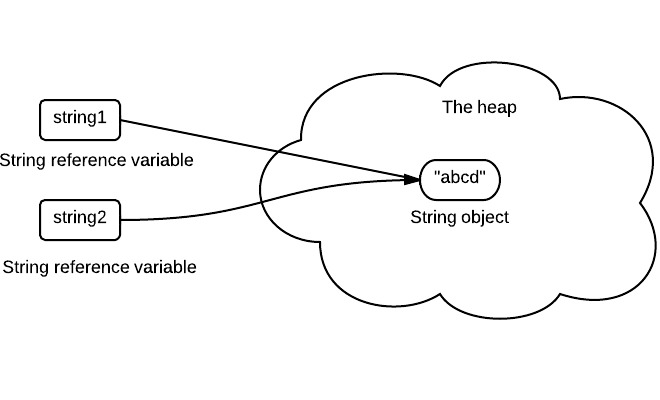Why Are Strings Immutable in Java? Insights into Memory Efficiency
Why Are Strings Immutable in Java? Insights into Memory Efficiency
Blog Article
Immutable Strings: A Key Component in Ensuring Information Uniformity and Integrity
In the realm of information monitoring, the relevance of immutable strings can not be overemphasized. These constant series of characters play a pivotal duty in upholding the integrity and precision of information within systems. By keeping a state of immutability, data uniformity is ensured, cultivating a foundation of dependability upon which crucial processes rely. The principle of immutable strings goes beyond plain triviality; it is a linchpin in the complex internet of information governance. As we discover the benefits, execution methods, and functional applications of unalterable strings, a more clear photo emerges of their crucial nature in safeguarding the digital landscape.
The Principle of Immutable Strings
Immutable strings, a fundamental idea in programs, refer to strings that can not be customized when they are produced. Essentially, as soon as a string worth is designated, any procedure that appears to modify the string in fact produces a new string. This immutability ensures data consistency and integrity in applications, as it prevents unexpected changes to the initial information.
Advantages in Data Consistency

Information consistency is important in different aspects of software program growth, consisting of data source administration, multi-threaded settings, and distributed systems (Why are strings immutable in Java?). Unalterable strings add dramatically to accomplishing this consistency by protecting against information corruption due to simultaneous access. In circumstances where numerous processes or strings interact with the very same data concurrently, unalterable strings serve as a safeguard versus race conditions and synchronization issues
In addition, the immutability of strings streamlines debugging and testing processes. With unalterable strings, designers can trust that as soon as a string is established, it will continue to be the same, making it easier to trace the source of errors and making sure that examination situations produce constant results. This reliability in data managing eventually leads to much more robust and secure applications.

Executing Immutable Strings
Making certain the immutability of strings calls for a thoughtful strategy to their execution in software program advancement. One crucial strategy is to make string classes in a way that stops modifications as soon as a string object is created. By making strings unalterable, developers can enhance information consistency and dependability in their applications.
To carry out immutable strings properly, designers must favor developing new string items instead than modifying existing ones. This method ensures that as soon as a string is appointed a value, it can not be altered. Additionally, any type of operation that shows up to change the string needs to develop a brand-new string with the desired modifications rather than changing the initial.
Furthermore, utilizing unalterable strings can simplify concurrency administration in multi-threaded settings. Given that immutable strings can not be her latest blog changed after development, they can be safely shared among multiple threads without the danger of data corruption.
Duty in Reliability Assurance
In software growth, the utilization of immutable strings plays a crucial function in guaranteeing the dependability of information procedures. Immutable strings, when produced, can not be changed, making sure that the information they stand for continues to be constant throughout the application's implementation. This immutability building gives a degree of assurance that the data being processed will not be unintentionally changed, leading to unexpected outcomes or errors in the system.
By including unalterable strings right into software layout, programmers can improve the integrity of their applications by lessening the go to these guys dangers related to mutable data - Why are strings immutable in Java?. Unalterable strings help in preventing information corruption or unplanned adjustments, which can be specifically critical when dealing with delicate information or when information stability is paramount
In addition, using immutable strings streamlines simultaneous handling, as multiple strings can safely gain access to and share string information without the threat of one string changing the web content while another reads it. This element contributes substantially to the total dependability of the software system, ensuring constant and predictable habits in information dealing with procedures.
Applications and System Combination
The smooth assimilation of immutable strings right into different applications and systems is pivotal for guaranteeing durable data consistency and dependability throughout diverse technical atmospheres - Why are strings immutable in Java?. Immutable strings play an important duty in improving the stability of data exchanges and communications within complex software program communities. By including unalterable strings right into applications, programmers can minimize the risks linked with data tampering, unapproved adjustments, and unintentional alterations, thereby fortifying the total safety and security posture of the system
In the context of system integration, immutable strings act as a foundational component for establishing safe and secure communication channels and facilitating seamless information transfers in between various components. Their unalterable nature makes certain that data sent in between systems continues to be unchanged and verifiable, lowering the likelihood of disparities or mistakes that might endanger the honesty of the whole system. Furthermore, immutable strings can enhance interoperability between inconsonant systems by supplying a standard layout for information representation, making it possible for more efficient data handling and exchange procedures across interconnected platforms. By embracing unalterable strings in applications and system combination processes, organizations can fortify her latest blog their data facilities and maintain the dependability and consistency of their info possessions.
Final Thought
In final thought, immutable strings play a vital function in preserving data consistency and reliability in different applications and system combinations. By guaranteeing that strings can not be changed as soon as created, the honesty of data is preserved, decreasing the danger of errors and inconsistencies. Executing unalterable strings can substantially improve the reliability of systems, inevitably causing more accurate and reliable information handling.

Report this page